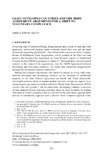LEAST DEVELOPED COUNTRIES AND THE TRIPS AGREEMENT: ARGUMENTS FOR A SHIFT TO VOLUNTARY COMPLIANCE
Abstract
Following years of intense lobbying, disagreements and a circus of back and forth
arguments, intellectual property rights eventually found their way into the legal
framework regulating global trade.1 This followed the conclusion of the Uruguay
Round of Multilateral Trade Negotiations, which resulted in the Final Act and
annexes that included the Agreement on Trade Related Aspects of Intellectual
Property Rights (TRIPS Agreement) as Annex C.2 Although there were protracted
contests in the course of the negotiations over the TRIPS Agreement between
developing and developed countries,3 the forum also witnessed disagreements
amongst the developed countries themselves.4
During the Uruguay negotiations, rifts started to emerge at a very early stage
between developed and developing countries on the inclusion of intellectual
property in the then General Agreement on Tariffs and Trade framework.
Developed countries, keen to expand markets for their enterprises, argued for a
comprehensive agreement embodied within the World Trade Organization (WTO)
system (‘the new system’).5 On the other hand, developing countries, conscious
of their underdeveloped structures and their need for more flexibility in dealing
with aspects of their economies that are affected by the generation, appropriation
and use of information, opposed such a scheme.6 Some countries opposed to the inclusion of intellectual property rights in the ‘new system’ argued that inclusion
of intellectual property in the WTO system would be superfluous and would
amount to unnecessary duplication of mandates as such were already sufficiently
covered by the World Intellectual Property Organization (WIPO).7
Against this backdrop of divergence in interests, the TRIPS Agreement only
managed to come out as a compromise, which aspect is manifested in various
ways. It strove to accommodate the concerns of both developed countries (major
owners of intellectual property rights) and developing countries (net importers of
technology). Further, the Agreement sought to strike a balance between owners of
intellectual property rights (IPRs) and the users.
Collections
- Publications 2019 [91]

